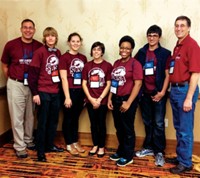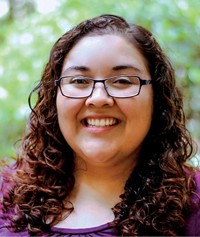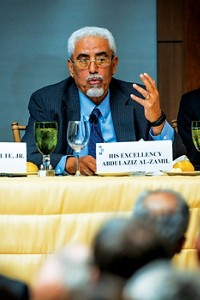Advertisement
Grab your lab coat. Let's get started
Welcome!
Welcome!
Create an account below to get 6 C&EN articles per month, receive newsletters and more - all free.
It seems this is your first time logging in online. Please enter the following information to continue.
As an ACS member you automatically get access to this site. All we need is few more details to create your reading experience.
Not you? Sign in with a different account.
Not you? Sign in with a different account.
ERROR 1
ERROR 1
ERROR 2
ERROR 2
ERROR 2
ERROR 2
ERROR 2
Password and Confirm password must match.
If you have an ACS member number, please enter it here so we can link this account to your membership. (optional)
ERROR 2
ACS values your privacy. By submitting your information, you are gaining access to C&EN and subscribing to our weekly newsletter. We use the information you provide to make your reading experience better, and we will never sell your data to third party members.
Careers
John G. Florez
Chemical engineering has taken this ACS Scholar around the world to encourage others to take up STEM education
by Alex Scott
October 26, 2015
| A version of this story appeared in
Volume 93, Issue 42
Mexican American chemical engineer John G. Florez, 39, grew up with his parents working seven long days each week in their car body shop in the town of Las Cruces, N.M., close to the Mexican border. “We were pretty challenged financially,” Florez says. Neither of his parents had a college education. But both encouraged their son to get one as a vehicle to a better life.
His eyes were opened to the possibility of a scientific career when his sister Maria, who is nine years older, began studying for a degree in biology at New Mexico State University (NMSU). He remembers walking through the university campus at around the age of 10 and gleaning scientific facts from Maria, who went on to obtain her doctorate from the University of California, Davis, and become a professor of physiology.
Scientific inspiration also came from Florez’s high school chemistry teacher, Sylvia M. Grace. “She was just phenomenal. She made chemistry exciting. She would take chemistry and apply it to real-world situations rather than it being a textbook exercise,” says Florez, who still keeps in touch with her today. “I always knew I wanted to do science, but she really opened my eyes to chemistry and then chemical engineering.”
In high school, it became clear to Florez that he would need to secure a scholarship to pay for college. And that is exactly what he did. Grace, who today is an instructor of engineering at Casteel High School, in Arizona, pointed Florez toward a number of scholarship programs.
Florez secured several scholarships. One from the American Chemical Society—by far the biggest—paid for his books and about half of the fees to study chemical engineering at NMSU. “Without the [ACS Scholars Program], I am not sure how I would have made it,” Florez says.
He chose the engineering path because he enjoys analyzing and solving problems. “But mechanical engineering was never really my thing. I was more interested in the chemistry side and the reactions that were involved in getting from the problem to the solution,” Florez says.
By the time Florez graduated in 1998, he had numerous job offers. He chose to work for ExxonMobil in Baytown, Texas, “because they were the biggest, they were the best, and they had the biggest global footprint,” he says.
In his first few years at ExxonMobil, Florez was involved in maximizing a refinery’s output and then went on to learn about the economics of running a refinery before taking up a supervisory role in 2003 managing a machinery engineering group.
By the time he was 29, Florez was running part of ExxonMobil’s refinery business in Joliet, Ill., with responsibilities that included running part of the plant and a team of about 40 individuals.
In recent weeks, Florez, his wife, Valerie, and their three-year-old son, Nicholas, returned from a two-and-a-half-year stint in Rotterdam, the Netherlands, where Florez had been assigned as technical manager to ExxonMobil’s Rotterdam refinery.
The family made the most of its 26-month posting in the Netherlands by visiting roughly 24 countries around Europe. “It was one of the most enjoyable experiences in our lives” he says.
He is now back in the U.S. working for ExxonMobil’s Baytown refinery as operations department manager. The wide variety of professional roles Florez has had and the global travels he has been on mean that ExxonMobil has more than lived up to expectations, Florez says.
An additional role he has taken on during his years at ExxonMobil has been to encourage other Mexican Americans to establish a scientific career. Since 2001, Florez has been involved in ExxonMobil’s diversity and science, technology, engineering, and math (STEM) recruiting efforts and joined the NMSU recruiting team for ExxonMobil. “I promised myself that when my career started to take off I would go back and tell people about the importance of STEM,” Florez says. Not everyone has an inspiring older sister or high school teacher, he says.
In 2005, Florez became the ExxonMobil recruiting team captain for the Society of Mexican American Engineers & Scientists (MAES). In 2008, he was elected to the MAES National Board of Directors. His involvement with MAES is one reason why ExxonMobil sponsors the organization’s symposia. Mexican Americans continue to be poorly represented in STEM subjects at the university level, Florez says.
“If there is one thing I would like to see change about science and engineering, it is getting more people to see the value in STEM degrees. It’s about opening their eyes early on—even from early school age—about career opportunities. This is crucial to keeping the pipeline of future engineers and scientists full and healthy,” Florez says.







Join the conversation
Contact the reporter
Submit a Letter to the Editor for publication
Engage with us on Twitter